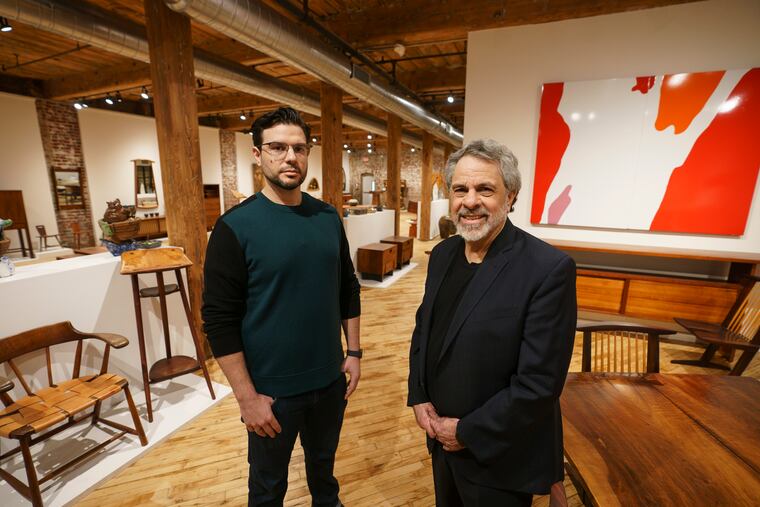Moderne Gallery has a new generation in the high-end furniture biz, now in Port Richmond
Robert Aibel, who founded the influential Old City gallery, is co-directing the new place with his 34-year-old son Joshua.

Robert Aibel opened Moderne Gallery in 1984, and for decades he was accustomed to acting unilaterally, being the boss.
The gallery’s origin story goes like this: An academic, Aibel was a full-time art and film professor at Drexel when a work trip took him to France. Coincidentally, he and his wife had recently bought a new home with art deco features, and Aibel went on something of a furniture shopping spree in the birthplace of deco. Immediately, he’d found a new calling.
“It transformed me,” he says now. “All of a sudden, I was passionate for it.” Aibel and Moderne Gallery have enjoyed a 35-year run, mostly from their Old City storefront on Third Street, where they helped anchor the neighborhood’s art scene in its vibrant, First Friday heyday.
Now Moderne has moved to a new 4,800-square-foot showroom location at 2220 E. Allegheny Ave., its formal entrance via Witte Street.And there, a younger Aibel — Robert’s 34-year-old son, Joshua, is coming into his own as co-director and design director. Much of the new Moderne Gallery is the result of his vision.
Joshua is quick to explain that he started at the bottom. At 22, he was a fledgling jewelry maker, and by his own admission better at selling the jewelry than creating it. At one show he would just as soon forget, all the jewelry was stolen.
At loose ends, he turned to his father to learn the vintage furniture business. “I started in the wood shop,” he remembers. “My father wanted me to learn from the bottom up.” He went to work with his cousin Jason Joyce, refinishing pieces by George Nakashima, whose bow-tie-joint furniture has become nearly synonymous with Moderne.
(Robert’s first Nakashimas came through an estate sale. People kept buying it from the warehouse — so much so that it was hard to get the pieces onto the gallery floor.)
When Joshua eventually made it out of the basement and onto the sales floor, he managed to sell a Sam Maloof rocking chair for more than $40,000. Maloof, who died 10 years ago, was the first woodworker to receive a MacArthur fellowship, otherwise known as the “genius award.”
Step by step, Joshua became conversant in the language of the 20th century studio craft movement and its important artists, from Nakashima and the Hamptons-based furniture maker David Ebner to metalsmith L. Brent Kingston and enamelist Paul Hultberg.
Before the Aibels left Old City, Joshua tried out his aesthetic — more open, a concrete floor, losing the carpeting and the brown walls. His efforts proved to be a trial run for Moderne Gallery 2.0, which has about the same square footage as the old five-story space but sprawls on a single floor.
“Platform design plays a big part in how we show the pieces, taking them off the floor so people can see them in a new light and from all angles,” he explains. “I had these ideas for a long time, and was finally able to put them into use.” The streamlined look suits a clientele that tends to book appointments rather than walk in on a whim. “We don’t rely on street traffic,” he says. “The people who come here are serious.”
Robert likes what he calls the “modern envelope” at the new space: When he saw it, “I said, ‘Oh my God, he’s good at this, I’m not as good at this as he is.'”
Joshua says he continues to learn on the job alongside his dad. “He built this business," he says.
“Now,” Robert says, “we don’t do anything unless we both agree.”